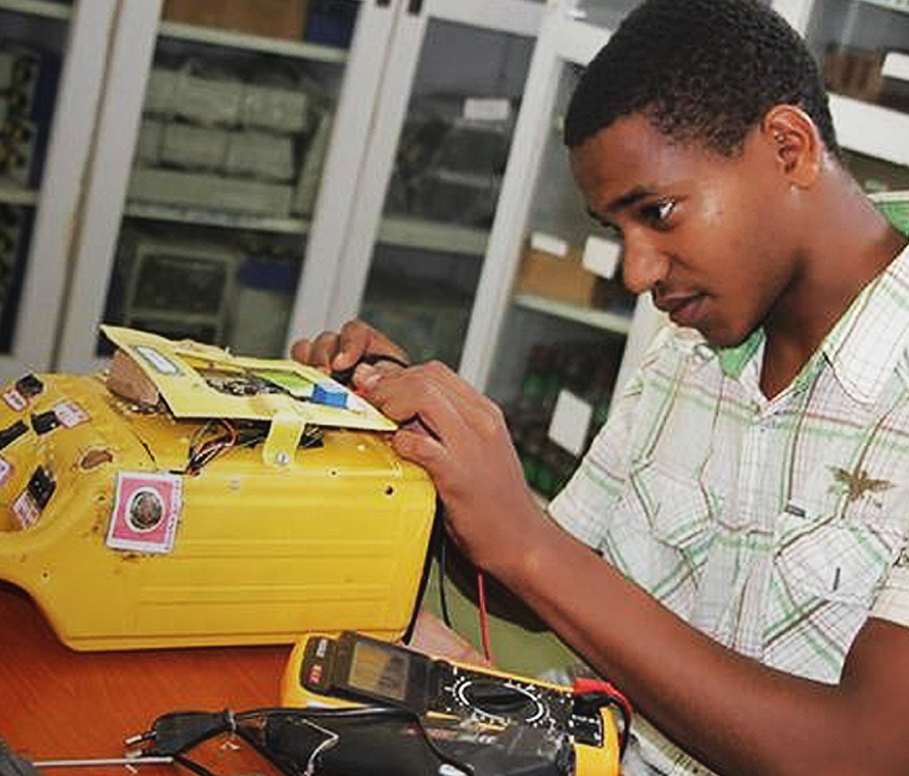This case study is based on an article published by Deutsche Welle. The original article can be found here.
WHO: Ezedine Kami, an 18-year old science student and inventor from Welkite, Ethiopia.
THE CHALLENGE: The COVID-19 pandemic continues to impact the health and wellbeing of the world’s population. As nations attempt to coordinate efficient acquisition and delivery of the recently developed vaccines, they also need to be ensuring that preventive and protective equipment continues to be available and accessible. Throughout the pandemic we have seen the value of innovation in improving the safety of those at risk and slowing the spread of the coronavirus. However, the past year has also shed light on crucial gaps in the innovation ecosystem that, when filled, would have the potential to increase the quality of life for many grappling with the pandemic and beyond.
THE OPPORTUNITY: Ezedine Kami is a young science student living in a rural, low-income town that typically faces monumental logistical challenges when sourcing medical and personal protection equipment. When he recognized that his community lacked certain innovations that would improve their safety during the COVID-19 pandemic, Kami utilized his own skills and creativity to meet the needs of his community in a sizeable way. To date, Kami has 30 inventions to his credit; thirteen have already been patented.
INNOVATION IN ACTION: Several of Kami’s inventions are catered specifically to meet needs related to the COVID-19 pandemic. His first, a contact-free hand washer, enables members of the community to practice essential personal hygiene in a safer way. Kami created a contactless electrical soap dispenser with a built-in sensor. The machine can also be operated using a mechanical pedal, which is essential during power blackouts that happen often in Ethiopia. Kami was able to partner with a local university and distribute these hand washers in banks and hospitals across his hometown.
Next, Kami turned to the scarcity of working ventilators in Ethiopia. According to the Ethiopian health ministry, the country only has 557 ventilators, 214 of which are owned by private hospitals. The high price of ventilators poses a barrier to obtaining an adequate number of machines, so Kami set out to build one himself. Teaching himself everything he needed to know from information online, Kami successfully built working ventilators for his community using a plastic pouch and a screen operated by a cellphone.
Kami also sought to build a device that would remind people not to touch their faces, which is a major vehicle for COVID-19 infection. “The device is like a watch with a sensor,” he explains, “every time the hand approaches the face, the device rings, reminding the wearer not to touch their face.” The device is also capable of monitoring the 6-foot distance required to decrease the risk of COVID-19 transmission. To make this remarkable technology, Kami used discarded electrical appliances and plastic material, making the watch durable and cost-efficient.
Innovations like these have the potential to make a difference in the safety and livelihood of communities throughout Ethiopia and worldwide. That said, Kami points out that a lack of adequate funding has posed a significant barrier to widespread distribution of his inventions. His goal, he says, is to partner with members of the public or private sector for the necessary financial support. Kami’s experience underscores the important role of intellectual property (IP). Robust IP systems encourage investment into innovation and enable critical partnerships that help bring novel products and processes—like Kami’s—to market. In fact, research shows that when emerging markets adopt strong IP laws, it helps level the innovation playing field by facilitating collaboration and encouraging foreign investment.
The promise of Kami’s inventions could helped be fully realized through the power of IP, which allows for the types of partnerships and meaningful investment that the young innovator is seeking out. Robust IP lays the foundation not just for Kami, but for all young inventors, to gain stable footing and see their life-saving ideas make a meaningful difference.



